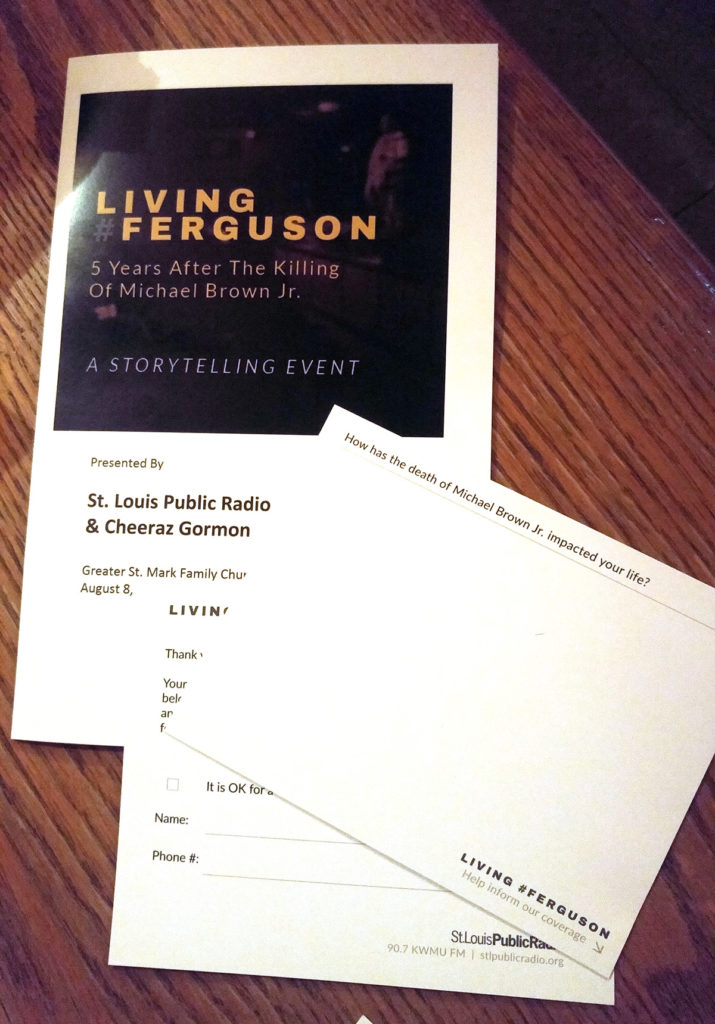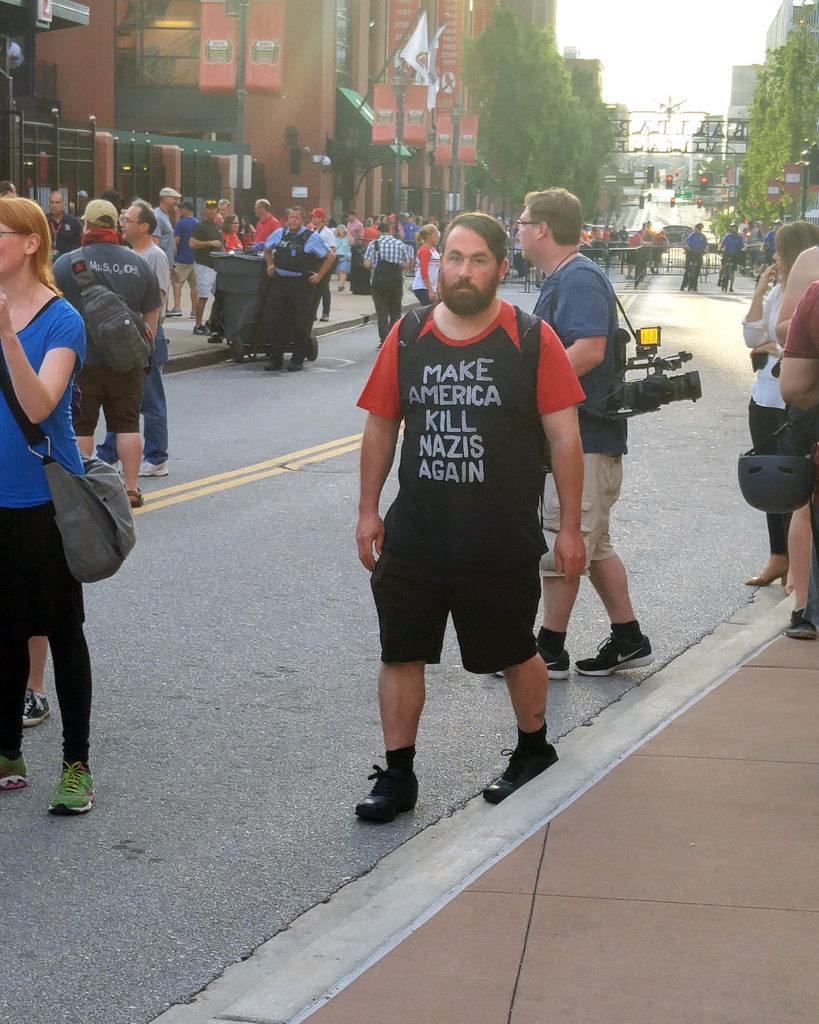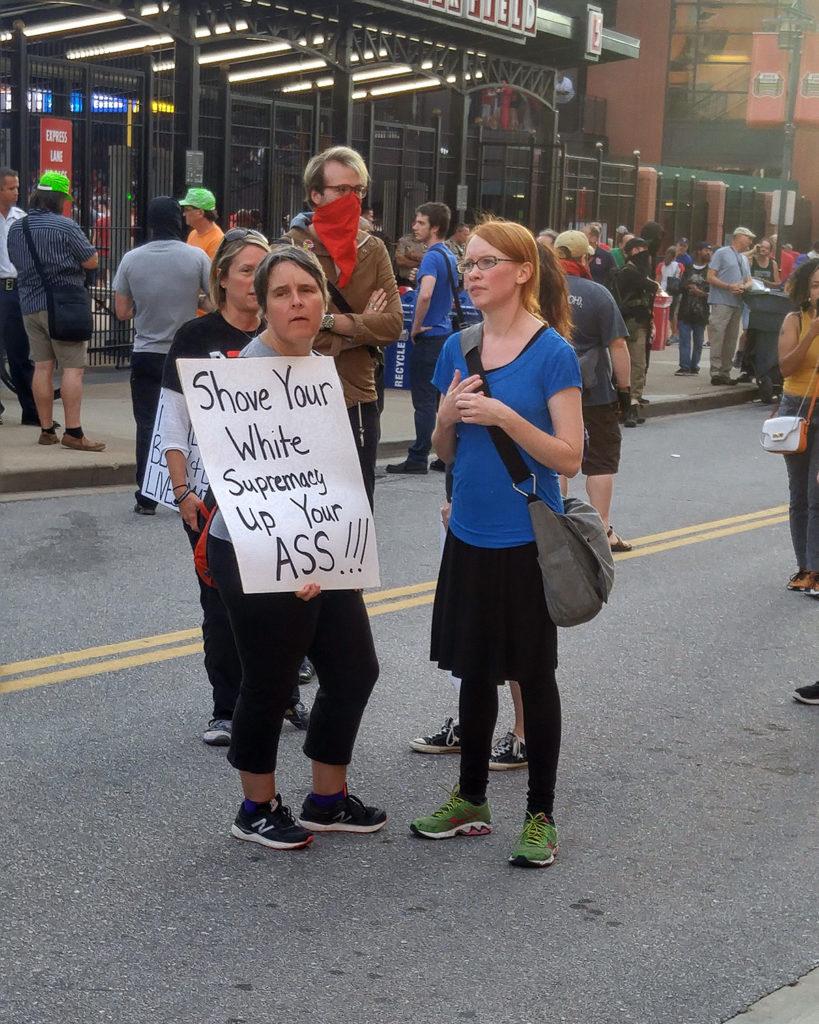How has the killing of Michael Brown Jr. impacted you?
All I could do was stare at this question. I was with Chris at Greater St. Mark Family Church, the eve of the five year anniversary of Mike Brown’s killing in Ferguson, MO. We were attending a St. Louis Public Radio storytelling event, #LivingFerguson. Persons of color were sharing their truths and their experiences as they reflected on taking to the streets of Ferguson in 2014.
During intermission, we were handed a card with this question on it: How has the killing of Michael Brown Jr. impacted you? All I could do was stare.

How has Mike Brown’s death impacted me and changed my life? I had so many thoughts and became overwhelmed. Tears came to my eyes. Where do I even begin? Before I knew what was happening, the last five years of my life flashed before my eyes. Protests. Jobs. Friends. Family. Joys. Pain. Adoption. Being a white mother to three black girls. I thought of all of this and more in just a blink of the eye.
Listening to persons of color
After August 9, 2014, I have attempted to immerse myself in the conversation. I want to hear the truths and experiences of persons of color. Listening is important. It’s the best way I have found to truly hear and understand why people of color have such a different experience with police than I do. Listening to people of color has also shown me that they have a different experience in society overall than I do. Through listening, I have learned more about our country’s history. I have learned more about my family. And I have certainly discovered more about myself.
Now as a white mother to three black girls (and yes, the race distinction is important), I need to listen even more. I also need to try to understand why experiences are different for people simply because of the color of our skin. During the past five years, the killing of Mike Brown has impacted me by opening my eyes to the systems we have in place.
The whole damn system is guilty as hell
One of the protest chants on the streets of Ferguson stated that “the whole damn system is guilty as hell.” Honestly, I didn’t understand this back in August of 2014. I had no idea what the protesters were saying. Sure, it didn’t seem right and just that Mike Brown had been killed. But the whole system is guilty? What system are you even talking about?
But these questions only occurred because I’m hopelessly white. I had never experienced racism. Being a minority race in my own country is something I have never experienced. I also wasn’t living in a society that had fought to keep slavery, enacted Jim Crow laws, and allowed sundown towns to exist. Ok. I was and am living in that society, but prior to August 2014, I didn’t think about it much. I could maneuver around it – basically living in another society – and never admit to the racist laws that still exist today.
After August 9, 2014, I could no longer turn a blind eye to the truths I was hearing, reading about, and encountering first hand.
The “r” word no one wants to talk about
Fast forward two and half years to May 2017, and I certainly could no longer ignore the racist society in which I was living. And yes, I am saying our society is racist because the majority of us have racist ideas about people who are black. Just ask Professor Ibram Kendi, an African-American man, about the speech he gave on black youth when he was young.
Why do most of us have racist ideas? Because in our country, we are all ingrained with these lies. The media perpetuates them. Movies and books have historically perpetuated racist thoughts. And even the history we learn in school teaches these racist ideas.
Mike Brown’s death and having three black daughters has made me even more aware of how we talk about people, how we talk about race, and my own racial biases.
Moving from observer to protester
One of the more interesting ways that the killing of Mike Brown has impacted me – after I became a mother – was to more fully participate in protests. Confession time: taking to the streets of Ferguson and other places around St. Louis was never easy for me. It took me a while to truly be a participant in protests instead of simply being a body standing on the sidewalk. I wasn’t willing to block traffic for fear of being run over by a car. I wasn’t willing to be front and center at a protest. And I feared being arrested. Even though arrest was always a possibility if I was at a protest – even if I was just standing still on a sidewalk – I took all precautions, including using crosswalks to cross the street.
Then I became a white mother to three black girls in May 2017. Charlottesville. The officer who killed Anthony Lamar Smith in St. Louis was found not guilty. The death of Edward Crawford. All of these things happened within a few months of becoming a mother.
Whew.
I regret not attending Edward Crawford’s funeral. But when Charlottesville happened, all I could think of was that could have been me. I could have been protesting with a group of people when a car came flying through the streets. After all, I had been steps away from other cars that had hit people or driven through protesters in Ferguson and St. Louis. And now, I have three girls. I have three beautiful black daughters who are going to encounter racism, who may have already encountered racism, and I need to say something. I wanted to do something and be with the protest community. That night, August 12, 2017, I took to the streets of St. Louis to protest white supremacy.

Gathering for the protest on August 12, 2017 
Protesting in front of Busch Stadium 
Protesting against white supremacy
Using my body to counter racism
A month later, September 15, 2017, the officer who shot and killed Anthony Lamar Smith in St. Louis was found not guilty. Protests immediately occurred downtown. I was working just a few miles away and could not focus on any of my tasks that morning. After lunch, I went downtown and joined the protests. I watched in horror as two of my friends were nearly run over by a bus. Then, only a few yards away from me, people were being tear gassed and thrown into police cars.
I decided to step off the sidewalk and into the street. It was the first time I physically used my body to fully participate in a protest. I stood with other protesters on the streets, near the courthouse, and linked arms.
One young woman I was near could not have been more than twenty years old, possibly just a teenager. She was a beautiful black woman and something about her facial features reminded me of BW. At that moment, I was overwhelmed with the thought of how much more personal protesting is now. “I’m now a mother to three black girls,” I thought to myself as I stood on the street to protest racist systems we have in place, to protest violence against black people in our country and to chant, “Black lives matter.”
Do justice and love kindness
When I went out to the streets of Ferguson in August 2014, I had no idea I would be a white mother to three black girls in the future. I went out five years ago because I didn’t understand what was happening in my community or the systemic racism in our country. But I wanted to learn and hear the truth. Persons of color were sharing truths and experiences that were not my own. I and other white people need to acknowledge and affirm these experiences.
So how has the killing of Mike Brown impacted me? There’s still much more to say on this topic. But his death has made me open my eyes and ears to experiences that are not my own. His death has moved me out of my comfort zone and onto the streets when injustice occurs. I no longer turn a blind eye to racism in our country. And I now see Michael Brown Jr. as my son, as our son. After all, I have three beautiful black girls who will face racism in a very different way than I ever have.
In a word, the death of Michael Brown Jr. has made me woke.


Soul-searching, emotional writing there, Lindsey!
Beautiful.
Love you ?